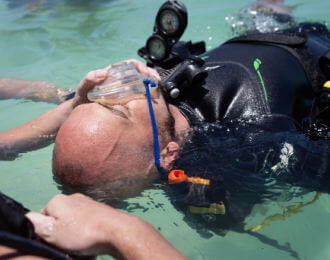
If serious injury or death is involved the SCUBA certification agency will have an investigator on the scene within a matter of days to collecting information.
You or your representative should be doing the same thing. You should:
- Maintain a copy of any promotional literature that you have reviewed or received relating to the dive.
- Obtain the name, address and home/work phone numbers of any witnesses that you believe observed any portion of the dive.
- Obtain the name of the divemaster, dive-buddy and instructor.
- Many dive operators attempt to capitalize on your dive by taking a video which they offer for resale at the end of the dive. If this is the case for the dive, it is imperative that you obtain a copy of this tape.
- Obtain a copy of the police report regarding the accident.
- Obtain a copy of the coast guard report regarding the accident.
- Photograph injuries as soon as possible.
- Photograph the scene of the accident. Videotape it if possible. Make sure something like a newspaper is used in the video or photograph to enable you to correlate the photo/video to date.
- Secure all scuba diving equipment that was used on the dive and make sure that it is not altered in any way. If a fatality or a serious injury is involved the investigating officer may take possession of the equipment for testing. Try to find out where the testing will be done and keep informed of the results. Make sure to take possession of the equipment (or find out who did take possession) as soon as possible. Sometimes the manufacturer may be called on to examine the equipment. Make sure that you let the investigating authority know that you object to this and request a disinterested party look at the equipment.
- Secure photographs or videotapes from any person in your party that participated in the dive.
- Get the names, address and work/home phone numbers of any other persons who were in the vicinity who took photos or videotaped any portion of the dive preparation, dive and/or dive aftermath.
- Obtain all documents that were given as part of dive instruction or excursion.
- Retain all documents that were signed by the victim or obtain a copy of all documents signed by him/her. This includes any ‘limitation of liability,’ ‘release’ and/or ‘waiver’.
- Often an insurance representative or attorney will contact the victim of an accident in an attempt to obtain a written or recorded statement. Understand that they are not taking the statement so that they can assist the victim – they are on the other side of a potential lawsuit. Do not give a statement without consulting an attorney.
- Retain all records of payment for the dive, dive training, transportation, and/or dive course (charge card slip, checks, written receipts).
- If the accident resulted in the death of the diver the potential defendants (through their insurers, attorneys and doctors) invariably assert that the death was the result of a “spontaneous cardiac arrhythmia.” A spontaneous cardiac arrhythmia is an extremely rare event in real life, but an extremely popular defense. If an autopsy is performed you must make sure that the specimens are properly maintained and that you get a copy of the full written report. If organs are harvested, you should obtain all pathology reports. You should seek a competent medical opinion from a specialist as soon as possible.
This is by no means a definitive list of actions to be taken. You should consult an attorney as soon as possible in order to determine your rights. It would be wise to consult with an attorney who has experience in handling personal injury cases and especially diving cases. You may contact my office in Hawaii at (808) 800-0050, Massachusetts at (617) 716-7700 or me directly at (617) 996-2500. I am licensed to practice in Hawaii, Florida, Massachusetts, and Colorado. Most of the scuba cases we have worked on occur in Hawaii, Florida and the Caribbean Islands.
If you don’t ask me for legal advice, please ask another attorney experienced in handling scuba diving litigation. Contact us for more info.
